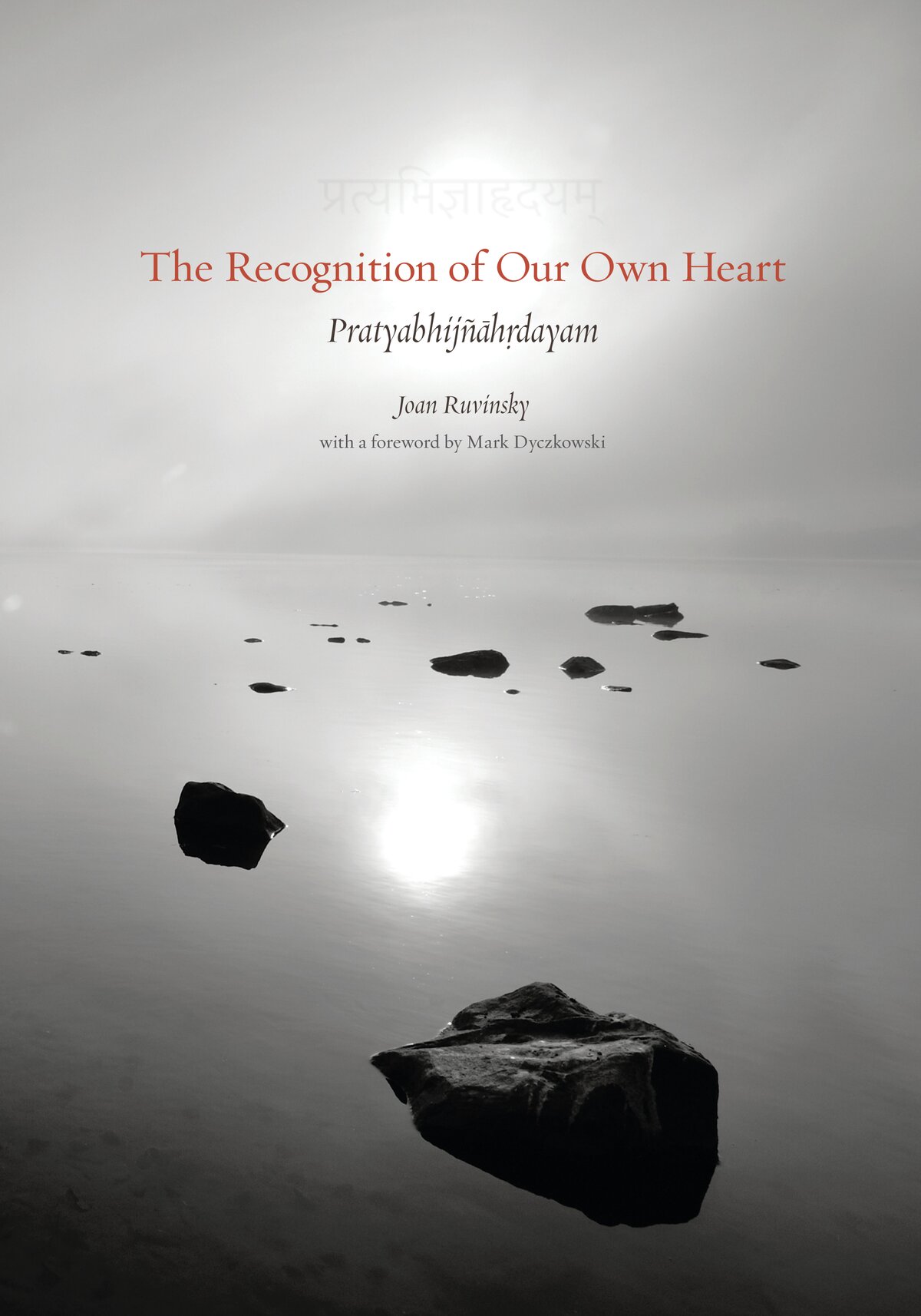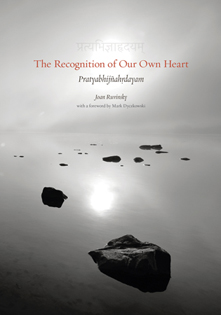The Recognition of Our Own Heart
par Joan Ruvinsky

vidéos de l'auteur
Lecture de son propre livre, par Joan Ruvinsky, à la réception d'un épreuve de “The Recognition of Our Own Heart” en janvier 2016, deux mois avant son décès. La version finale à été publié en 2019.
“In 2014, after our years of studying and translating this text, Joan Ruvinsky was diagnosed with terminal cancer. She embraced the news with grace, curiosity and enthusiasm, heading straight to her spiritual home in the mountains of southeastern Arizona where, from a cabin accessible only by four-wheel-drive or on foot, she continued to hike, meditate and write, frequently joking that she was now working under a strict “deadline.” It was there that the commentary of this book was composed.”
Kathleen Knipp
De l'épilogue de “The Recognition of Our Own Heart”
A Little GOD Intermission. Episode 01 * S T I L L N E S S *
This morning I was doing some sun salutations with my eyes closed. I felt “stillness” while moving. The feeling was so clear and beautiful. I used to think of stillness as something you carry with you. Now, I prefer the wallpaper interpretation. I made this video to explain it as clearly as possible:
Let’s say “stillness” ( AKA God ) is like a huuuuuge wallpaper.
Our bodies/character are like masks or contours that allow parts of the “god wallpaper” to appear.
The character is empty, just a white silhouette !!!
We, the characters, are “filters” that reveal parts of god, who is perfectly still.
Orazio Fantini
Musical artist and long-time student of Joan Ruvinsky
Sanskrit Erratum
enregistrement de l'invocation
A “live” recording of Joan and the other translators reciting the invocation in Sanskrit and English before a study session.
“Kshemaraja’s invocation is traditionally recited before the contemplation of the verses as an aid in assimilating the understanding of the text more deeply.”
Joan Ruvinsky, The Recognition of Our Own Heart,” p. 29
éloge pour 'The Recognition of Our Own Heart'
“I cannot lie. Joan Ruvinsky’s new book, The Recognition of Our Own Heart – an interpretive translation of the Pratyabhijñāhṛdayam – moved me. When it arrived I experienced the kinetic power Jeanette Winterson writes about. It didn’t throw me across the room, but for some inexplicable reason it would not permit me to open its covers. I walked around for some time clutching it to my heart. Then I sat down with it in my lap for an hour or more. It demanded deep stillness and undivided attention. Eventually I could open it, handle it and bathe in its sensuous beauty, its visceral wisdom.”
Continue reading:
https://thisunlitlight.com/2019/08/03/the-recognition-of-our-own-heart/
Miriam Louisa Simons
“Once while sitting with my beloved teacher, Joan Ruvinsky, I asked her how I should structure my sadhana—my spiritual practice.
She laughed and waved her hand, “One cannot do practice. One must be the practice.”
Certainly, it was her extraordinary presence that taught and liberated. I sat in awe of how during time with Joan there could be so little formal practice or verbal teaching, while the depth of her transmissions felt as if they were infused into my cells in such a way that they became me. While Joan’s measured words were wise and illuminating, she herself would say that they were irrelevant, really. Joan’s teachings were an experience of Being—direct perceptions into the nature of Reality.
Now, imagine if you will, that after receiving a terminal cancer diagnosis, Joan decided to spend the last months of her life meticulously giving birth to a creative expression of an ancient, little-known Kashmir Shaivist text called Pratyabhijnahrdayam. This is the importance of this work. This is the importance of Joan’s recently published book, The Recognition of Our Own Heart. The pages of this book hold the quintessence of Being as experienced through the prism of Joan’s rare perception. The text is a poetic and immersive heroine’s journey through the dance of creation—becoming embodied, exploring the changing physical realm, discovering how to recognize the unchanging Self, and then merging again with the Source. Together with three of the souls closest to her, Joan created not just a translation, but a vehicle to transmit the essence of this sacred text. ”
Continue reading:
https://www.irest.org/blog/non-dualism/reading-joan-ruvinsky-student-s-tribute
Molly Birkholm
iRest Yoga Nidra teacher trainer and author
When I opened the shipping package that contained my copy of “The Recognition of Our Own Heart.” I was taken in by the pure beauty of the book, by the details of the design and layout, by the solidity of the book’s weight, so much so that all I wanted to do was to hold and admire the physical publication.
At some point, I turned my attention to the text. I was not familiar with the basic text and was only slightly familiar with the “non-dual” history and writers. So, I had to spend some time orienting myself to where “Recognition” fell within that tradition and what the work was trying to accomplish.
I also had to become familiar with the basic structure of the “verses” and “commentary.”
The introductory material was very useful in providing a context for the work. The various presentations of the verses made the work approachable.
First, there was the “translation” of the verses, followed by “images and verses,” followed by “verse form,” followed by “ponderings,” followed by “practices.” There are several “books” within this “book.”
It’s hard for me to imagine the number of hours Joan, Susheela, Tina, and you devoted to this project. The payoff is tremendous — a version of “Recognition” for our times. Thanks to each of you. I’ll be integrating this text into my systematic practice.
I “read” the 20 verses and have pondered some of the “ponderings.” However, this is a book I will have “to live with,” much like the four members of your collective “lived” with the books you consulted.
While I’ve read the 20 verses, I feel like I’m “stuck on” verse one. I’ve been “pondering” several koan-like questions. For example: What is the “Unmanifested? How does the Unmanifest Manifest? These aren’t questions for the “rational mind,” but for the “non-rational” one or the “no” mind.
Thank you for this offering in the form or “Recognition.” I’m blessed to be in a position to receive it.
Jerome Paige
Washington, DC
“With deep reverence for this 11th century text, four women sat with all the translations they could find, chanting the Sanskrit, studying, analyzing and finally sensing and feeling into each line, until there was consensus, a mutual “ah,” and shimmer of recognition in the heart. Ruvinsky’s final poetic ponderings, sourced from this deep exploration with her beloved colleagues, her own intuitive understanding, and burnished in the wisdom of pure consciousness, is her final gift to us. I am ever-grateful.”
Amy Weintraub
Founder, LifeForce Yoga Healing Institute and author,
Yoga for Depression and Yoga Skills for Therapists
“Joan Ruvinsky’s very free rendering will perhaps make some scholars raise their eyebrows—which is not a bad thing. Her approach is fresh and relevant. It goes straight to the heart of our existence, and it is practical.”
Jean Bouchart d’Orval
Author, Reflets de la Splendeur-Le shivaïsme tantrique du Cachemire
“I highly recommend this book for beginners as well as adepts of yoga as a joyous celebration and theoretical confirmation of practical experience.”
Geetha Anand, Ph.D.
Author, Monistic Theism of the Tirumandiram and Kashmir Shaivism
“Linger with the poetry, ponderings and practices and delve into the intimate mystery
of our everyday extraordinary aliveness.”
Lorin Roche
Author, Radiance Sutras
“An instant classic that will be honored, for generations to come. Brilliant and empowering.”
Nischala Joy Devi
Author, The Healing Path of Yoga and The Secret Power of Yoga: A Woman’s Guide to the Heart and Spirit of the Yoga Sutras.
